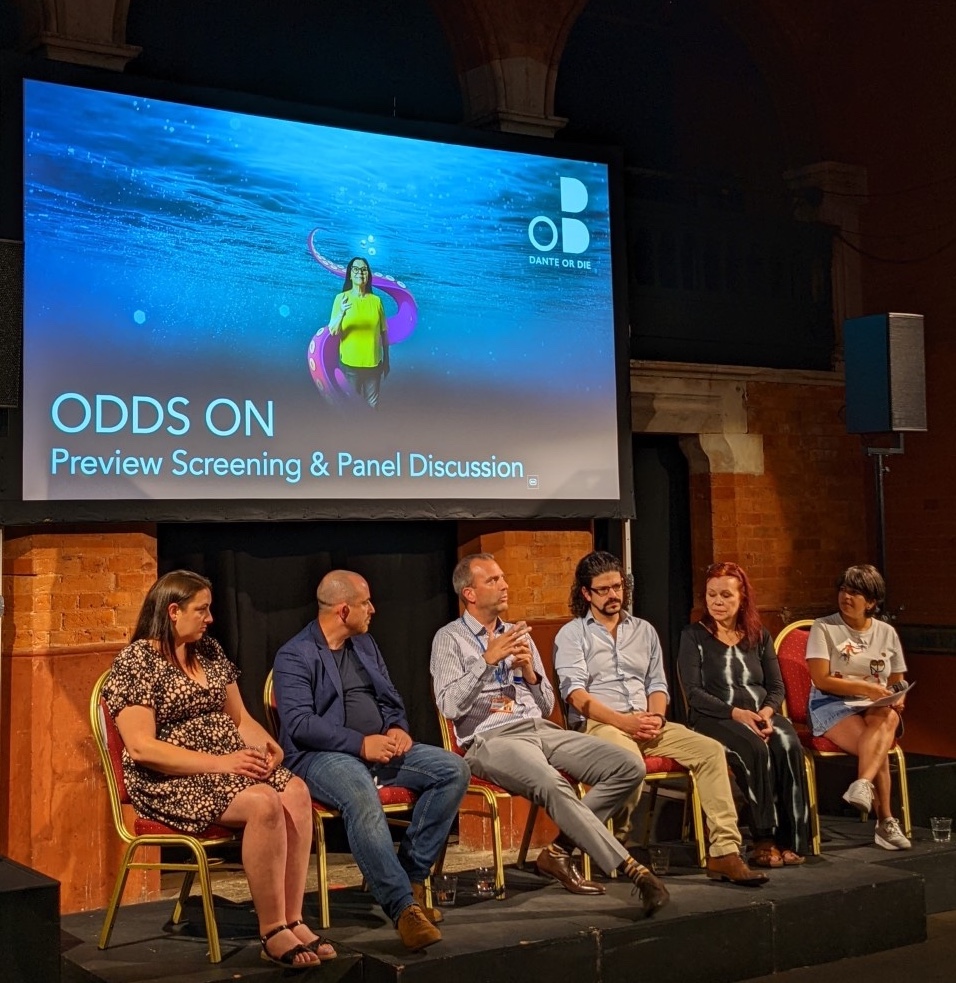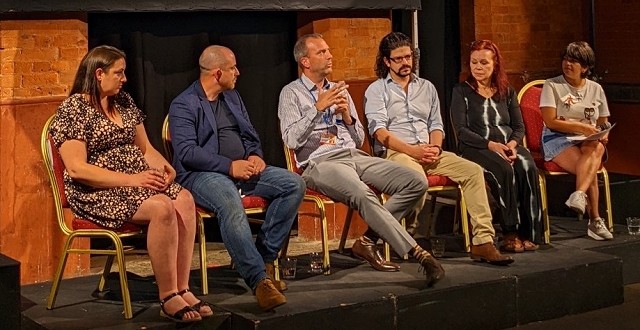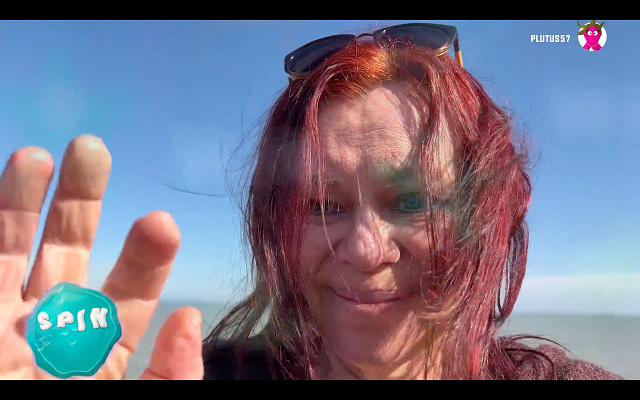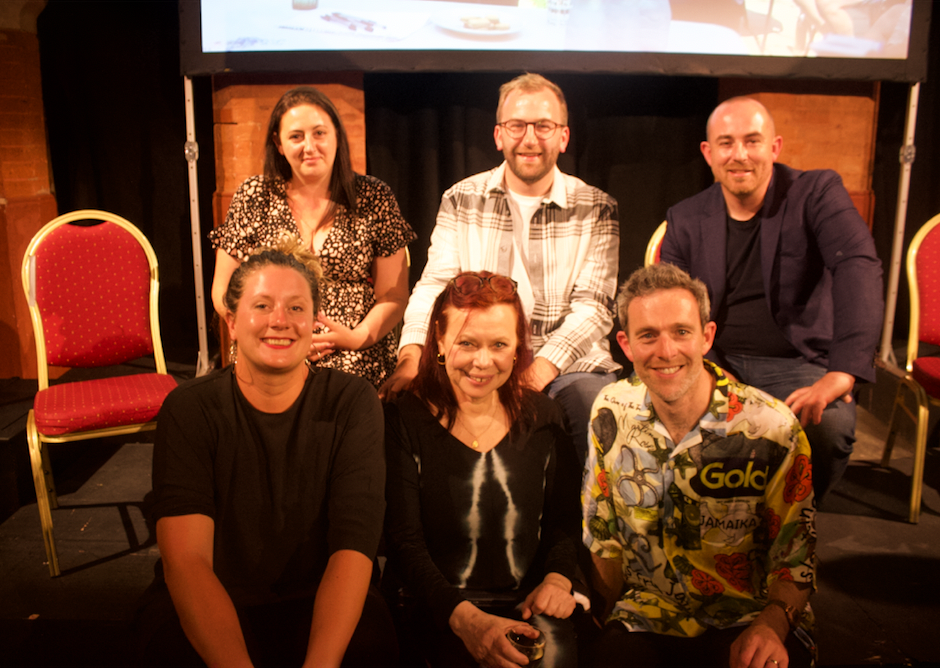
Odds On Blog: How online gambling lives amongst us
Odds On Panel Discussion
Behind the Screen: How online gambling lives amongst us
This blog is edited from an in-person panel discussion hosted by Dante or Die on 28 June 2022.
Odds On is an interactive short film about one woman’s addiction to an online gambling app. The film takes you behind the screen, into the depths of the online gambling experience, so you can see how your fellow players are really doing. You can watch the film here.
Panelists:
Dave Hollingsworth, Residential Treatment Manager for Gordon Moody, the UK’s leading dedicated charity, supporting people with gambling addiction.
Rob Davies, Guardian columnist, and author of Jackpot, How Gambling conquered Britain
Fiona Watson, plays Felicity in Odds On
Jade Vallis, Lived Experience Creative Advisory Group
Owen Baily, Lived Experience Creative Advisory Group
Hosted by Dante or Die's Trustee Ranjit Atwal

Have you noticed a change over the years in gambling since online gambling has become so readily available?
Dave Hollingsworth:
I’ve worked for Gordon Moody for 17 years, so during that time, we've gone from there being no online gambling to an absolute explosion of it. What we see in Odds On is exactly how it gets people. It's a 24 hour, 24 hours a day, seven days a week phenomenon. Going back 10 or 15 years, people who came into a treatment centre had a problem with their gambling in a betting shop, which shut at 5pm in the afternoon.
There was an off switch and what we see in the film is there's no off switch now. We see Felicity, the lead character, lying in bed, next to the light of her mobile phone screen, which is always on. And that wasn't the case 15 years ago. It must be a very, very frightening place to be in, whereby you’re paid a month’s salary and you can see that money going into your account at 1 minute past midnight and then by quarter past midnight, you've lost every penny.
We used to see guys in their 40s and 50s who had been beaten by a lifetime of hanging around in betting shops. It was a 9 to 5 world 10 or 20 years ago, and that's no longer the case. We see people who are younger and younger, maybe 21 year olds ending up in our treatment centre and that's connected to the fact that you can gamble 24 hours a day.
It was a very, very powerful film that we just just watched. It really hit home as to how impossible it must feel to be in the throes of addiction, when you’re being bombarded by someone purporting to be your friend, sending message after message, checking in and pretending that they really, really care about your wellbeing, when they're on a performance related bonus to keep you gambling and gambling. Odds On gives a really moving depiction of that.
And of course the main character Felicity had a really good support network. You can only imagine what the problem is like without a support network, what they must be feeling and going through.
Dave Hollingsworth:
If you have loved ones around you, you’re so frightened that you don't want to open up about the problem. And actually gambling is a hidden addiction. If it was hidden before, it’s even more hidden now with the cloak of anonymity behind your screen and your nearest and dearest not knowing what you’re doing. And £1000s just disappearing before your eyes, but not in front of your loved ones. That was a message that came through loud and clear.
Jade Vallis was part of the lived experience advisory panel and she's been working with the creative team since last October. Just wanted to bring Jade in to the discussion, to talk about her experience of putting these issues in a film and being part of the creative process.
Jade Vallis:
Everything that you saw in the film, I have experienced. Every problem was multiplied by gambling. I couldn't open up to my partner, my kids, because of the lies and I felt so guilty. The process has been amazing, I’ve enjoyed putting my opinions across and if there’s one person who sees the film, and who can start a conversation because of it, then it's all been worth it.
Owen, so you do a lot of work to raise awareness of gambling harm. What were some of the key things that you wanted to really address?
Owen Baily:
As a country, since the 2005 Gambling Act, the gambling industry has grown exponentially. You need projects like this to counteract the normalisation of gambling advertising and get the message out there that gambling is harmful and it can kill. I’ve watched many gambling documentaries and programmes over the years and if I find myself really immersed and emotionally roused and getting upset, then the project has been a success because it's somehow been able to capture the raw experience of someone who's had a gambling problem. I speak from the point of view of having developed a gambling addiction from the age of 16. I had treatment for 16 years and it took me about two decades to get over my gambling problem. To watch this, it does capture so much of my own experience really quite well. And it demonstrates how absorbed people can get to the absolute point of neglect of those that love you in terms of family and friends.

So there's a government white paper to be published about gambling harm. We wondered, with your expertise Rob, what are the main areas of concern that the recovering gambling community are really asking for?
Rob Davies:
First of all, let me say congratulations on a profoundly effective film. It is so reminiscent of dozens of conversations that I've read over the course of time. Dave has highlighted the way gambling has changed. I don't know how many of you remember, but it seems almost quaint now that the question in 2005 was over whether or not we were going to have super casinos across the country. Various places, then it got whittled down to one and eventually got rid of the whole thing. And it seems almost ludicrous that this was a moral panic, when now everybody can access a casino, more than one casino if they have multiple brands, on their smartphone. So clearly this legislation is out of date, but now a white paper is coming out and as you mentioned, the government is going to put forward much delayed proposals for reforming how gambling is regulated in this country.
There are a number of key areas, there are issues around affordability for instance. Should there be affordability checks to kick in once you spend a certain amount of money? That's a big issue that's up for grabs. Stake limits, for instance, should there be a limit on when you can stay on the kind of slot machine games that we saw in the film? I don't know if any of you remember the fixed odds betting terminals debate around the kind of digital roulette machines that you get in shops, those are limited to £2. Maybe we should see something similar for slot machines?
You've also got a big issue around the levy. At the moment the gambling industry pays a voluntary levy that goes into funding research, education and treatment. Almost everybody except the gambling industry thinks that that should be a mandatory levy and then it should be taken entirely out of the industry's hands and it should go to people like Gordon Moody, into the NHS, as well as on people with specialisms and not necessarily to just helplines and so on which it normally goes to the moment. It's looking like the government's not going to do that, that’s the mood right now.
Things like inducements, free bets, free bonuses, free spins like what we saw in Odds On, there's some talk around that being regulated. And then there's stuff like sponsorship on football shirts, and wider advertising which helps normalise gambling for younger people. About six months ago, I was quite confident that the government was going to come down quite hard on regulating the industry much more strictly. I'm less confident about that now, there are people who've left Downing Street who were keen on these policy areas. It's all up for grabs really, it’s a once in a generation moment for changing how we regulate gambling in this country.
Fiona, were you aware before we started working on this project that online gambling was so prevalent amongst older women?
Fiona Watson:
I had no idea to be honest with you. As an actor, my job is to find out about these things, really, The creative advisory group that we worked with, were my guides. We had meetings on Zoom and they would tell their stories. We did creative writing and they fully informed me as to what Felicity was going through, along with loads of other women.
